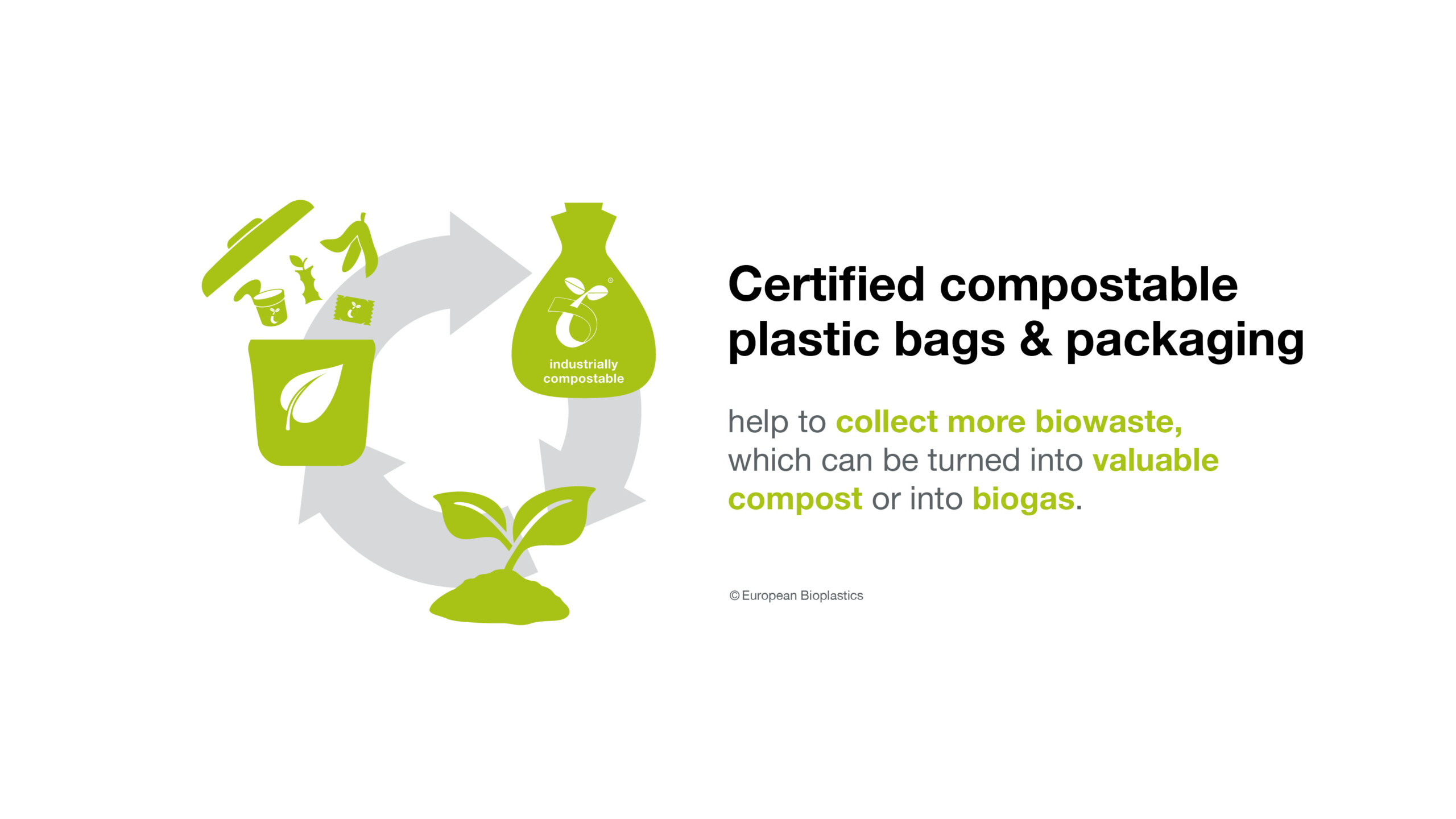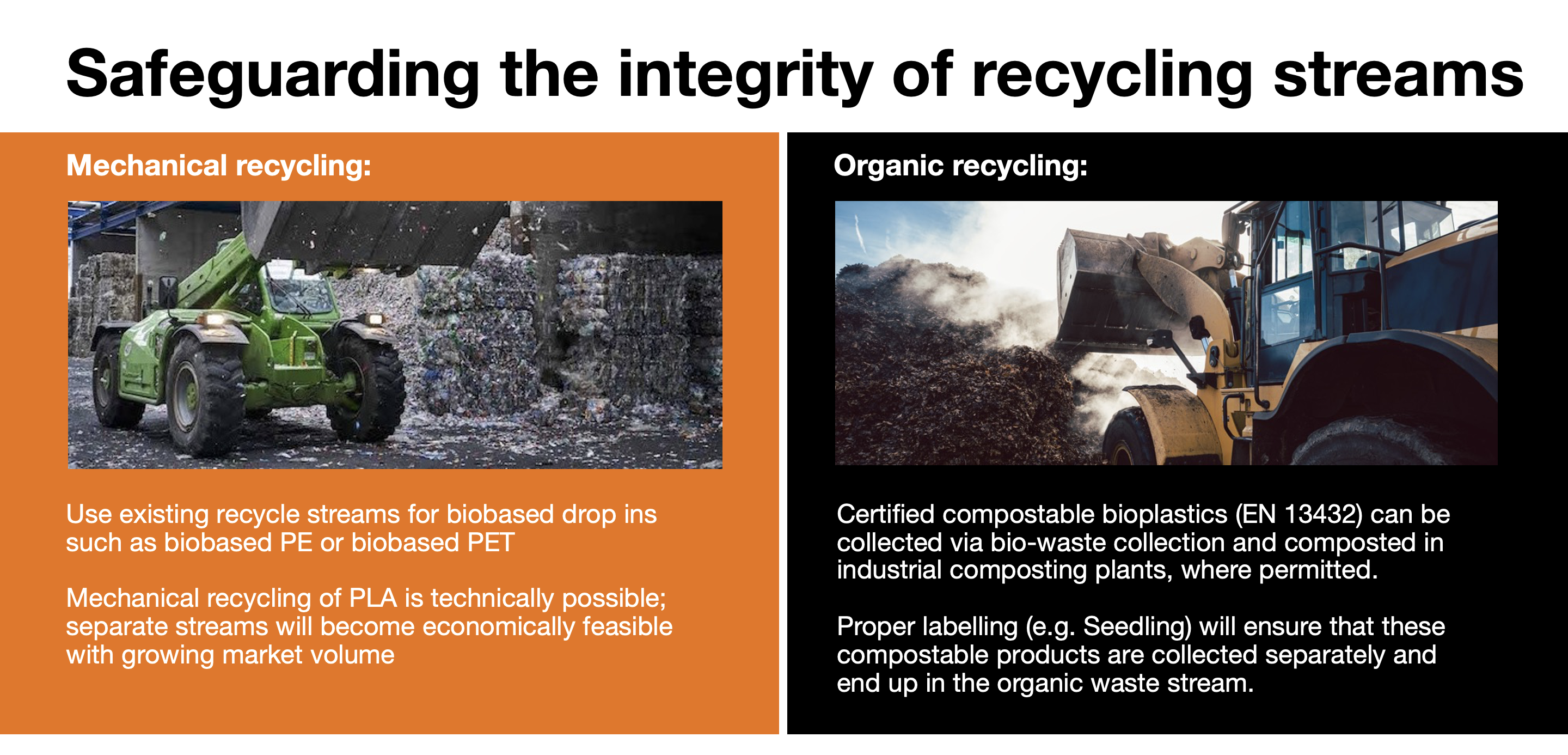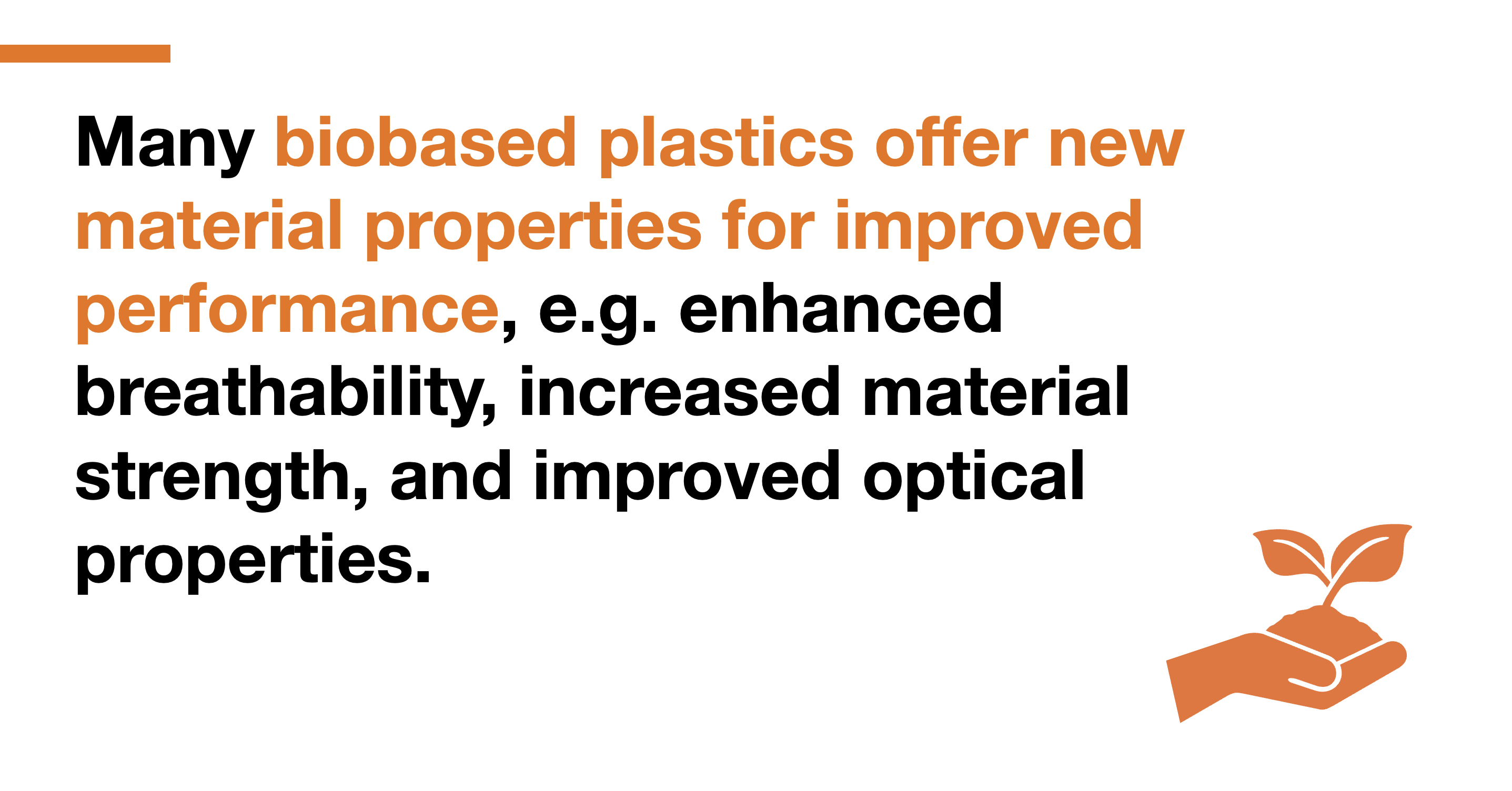EUBP STATEMENT on the EU policy framework on biobased, biodegradable and compostable plastics
Comments on compostable plastics
The role of industrially compostable plastics in a circular economy:
Industrially compostable plastics can play an essential role in putting the envisioned circular economy into practice. With reference to the European waste hierarchy, industrially compostable plastics provide added value through organic recycling (i.e., industrial composting and anaerobic digestion) as an additional waste treatment option, and by producing a higher volume and quality of valuable compost. Compost is a valuable resource that can be used as natural fertilizer benefiting soil health and helping to combat climate change. Additionally, a larger amount of separately collected biowaste can also help to increase the share of biogas production if the waste is processed via anaerobic digestion. Separately collection biowaste is diverting organic waste away from other waste and recycling streams and reducing contamination of these streams with. The more biowaste is being collected separately, the more is diverted from incineration or mechanical plastic recycling streams to organic recycling, hence reducing contamination of waste and recycling streams.

Facilitating mandatory biowaste collection:
Separate collection of biowaste will be mandatory across Europe by the end of December 2023. Certified industrially compostable plastics are proven to help efficiently manage biowaste by increasing the quantity and quality of separately collected organic kitchen waste. Compostability is a clear benefit when plastic items are mixed with food, food waste, and biowaste. Under these conditions, mechanical recycling is not feasible, neither for plastics nor biowaste. The use of certified industrially compostable plastic products such as biowaste bags, fresh food packaging, or disposable tableware and cutlery makes the mixed waste suitable for organic recycling as they can be collected and organically recycled together with the food waste.
Best case example:
In Italy, certified industrially compostable plastic packaging is politically supported and widely used and accepted by both citizens and composters. The appropriate collection systems and recycling infrastructure are in place as well as certification schemes based on the harmonised EU standard EN 13432. The use of these certified industrially compostable plastic products is evidently contributing to a substantial increase in volumes of food waste being collected and composted: in 2018, Italy achieved 80% separate collection of household food waste.[1] Italy also implemented the EPR scheme for compostable packaging that aims to collect and organically recycle compostable packaging together with biowaste. Accordingly, in 2021, Italy reached a recycling rate of 52%[2] of industrially compostable packaging placed on the market.
In other Member States, such as Germany, Belgium, and the Netherlands, the collection rates of food waste remain low at around 15-25%[3] despite separate food waste collection being mandatory. These countries have very restrictive rules on the use of industrially compostable plastic packaging for biowaste collection and organic recycling, which also inevitably leads to higher contamination rates (with conventional plastics) of the organic waste streams and the resulting compost.
Effects of compostable plastics on other waste streams[4]:
The Commission’s Communication presents the perceived risks of cross-contamination as an argument for restricting the use of compostable plastics. This argument, however, lacks any real-world evidence. In the unlikely event of compostable plastics ending up in conventional plastics recycling streams due to accidental misthrows, the existing sorting technologies are perfectly capable to sort them out, just as any other residual wastes. Cross-contamination is a general problem that involves all materials and all recycling streams. Singling out compostable plastics is discriminatory. Any restrictions based on the assumption of cross-contamination would have to apply to all materials.
Certified industrially compostable plastics can, in fact, help to reduce the contamination (plastic impurities) in the organic waste collection[5] caused by misthrows of conventional plastics that often end up in the final compost and cause persistent microplastic residues in the environment.[6], [7], [8] Certified compostable plastics also help to reduce the contamination of conventional plastic waste streams with organic waste by providing tools to make the separate collection of organic kitchen waste more convenient and efficient.[9]

Biowaste collection and recycling infrastructures across Europe:
The Communication states that not all Member States support the use of compostable biowaste. While this is the case in some Member States, there is a number of Member States and regions where compostable biowaste bags are well-established as means to collect household kitchen waste. These Member States have appropriate collection systems and organic recycling infrastructures are in place. It has to be noted that the waste management infrastructure across Europe, and in particular separate collection and sorting systems as well as recycling infrastructures, vary greatly. All too often appropriate and modern technologies are not used, especially when it comes to separate collection and organic recycling of biowaste. Sound investments in separate collection systems are needed to achieve an acceptable, higher functioning and more harmonised landscape across Europe. This is especially the case with a view on the upcoming mandatory separate collection of biowaste by end of December 2023, which will increase the amount of bio-waste (especially food waste) that will enter industrial composting and anaerobic digestion (AD) facilities.
Key applications of compostable plastic for the circular economy:
We fully support the priority of prevention and reduction in the EU waste hierarchy. Hence, we recognise that bioplastics are not intended to simply replace existing applications but, instead, to offer innovative solutions. To enable innovation, we recommend developing a set of criteria, similar to the criteria proposed in Annex III of the Commission’s proposal for a revised Packaging and Packaging Waste Regulation (PPWR), for which industrial compostability offers a valuable contribution to a circular economy and/or waste reduction. Such criteria should include the increase in the amount of separately collected biowaste and a reduction of the contamination of organic waste streams with non-compostable materials. Also, applications that cannot or are not likely to being recycled because they are contaminated with food waste, too small to be collected/sorted/cleaned prior to recycling, or that are made of non-recyclable multi-layer films, should also be made from compostable plastics.
The range of compostable plastic packaging applications suggested in the Commission’s Communication as well as in the Commission’s PPWR proposal should not be limited to a listed number of specific applications. Industrially Compostable plastic packaging should be allowed for all applications where they can bring benefits as laid out in Annex III of the proposal. Additionally, compostable plastic packaging must remain allowed in organic recycling waste streams for which they are designed and certified.
Single-use applications:
We agree on the importance of reducing single-use plastic products where feasible, but hygiene, health, and food safety cannot be compromised. The Commission’s Communication overlooks the important functional role of certain (packaging) applications in preventing food waste and in ensuring the strict safety and hygiene requirements for contact sensitive applications, also in the medical and health sector. Biobased and compostable plastic materials can provide sustainable alternatives where reuse, recovery, or recycling are not an option.
Compostable plastics for food-contact materials:
All kinds of bioplastics must comply with the same strict regulations as conventional plastics when used as food-contact materials (FCMs) and they must undergo the same testing procedures to access the market of the European Union. This includes migration tests according to the Regulation (EU) No. 10/2011, and tests on the composition of multi-component materials to make sure only substances and materials that have been assessed and listed as safe (Union List of authorised substances) are used. Additionally, plastics that are intended to be certified as compostable must undergo further ecotoxicity tests as part of the EU standard EN 13432 for industrially compostable packaging to prevent health risks. Therefore, some bioplastics materials need to pass even more rigorous testing than conventional plastic products.

Home composting for plastics:
EUBP supports the Commission’s view that home composting should only be considered in the context of specific local conditions. Home composting is not a professional waste management activity, but a private gardening practice carried out on private premises. It is also not available throughout the year due to seasonally fluctuating and generally geographically diverse ambient temperatures. The European standard EN 17427 covers disintegration and biodegradation requirements for home compostable carrier bags, and includes extensive ecotoxicity tests as well as clear rules on SVHC and fluorinated organic chemicals. The standard also includes guidelines on how well-managed home composting should look like and under which the certified bags then also biodegrade. Independent third-party certification schemes and labels exist based on EN 17427. However, EUBP recommends the separate collection of organic household waste with a dedicated biowaste collection system and subsequent treatment in industrial composting and AD plants. Home composting should only be considered as an additional option for the treatment of organic waste, especially for garden waste.
More comments
Find out about the specific benefits of biobased and biodegradable plastics and the shortcomings of the Commission’s Communication …
[1] Italian compost association CIC, www.compost.it, and Zero Waste Europe (2020) “Bio-waste generation in the EU: Current capture levels and future potential.”
[3] Zero Waste Europe (2020) commissioned by the Bio-based Industries Consortium (BIC): “Bio-waste generation in the EU: Current capture levels and future potential.”
[4] With regards to waste management options, it is important to note that bioplastics include a whole family of different materials. These materials can be treated in various established recycling and recovery streams and offer additional options such as organic recycling or chemical recycling. The major share of bioplastics produced today is mechanically recyclable. Biobased plastics that are chemically and physically identical to their fossil-based counterparts, but are made from biomass (so-called drop-in materials, e.g., biobased PE and biobased PET) can be recycled in already well-established recycling streams for PE and PET.
[5] A field test carried out by the University of Bayreuth (2020) examined composts from eight different biowaste treatment plants. Over 98% of the film plastic particles detected were attributable to PE or other conventional plastics. The researchers concluded that the use of compostable plastic bags for the bio-waste collection would lead to a significant reduction in plastic particles in the compost if PE bags were substituted.
[6] https://www.sepa.org.uk/media/327640/investigation-into-plastic-in-food-waste-derived-digestate-and-soil.pdf
[7] Weithmann et al., Science Advances 04 Apr 2018: Vol. 4, no. 4; “Organic fertilizer as a vehicle for the entry of microplastic into the environment”
[8] Kern et al., Müll und Abfall 05/2020, Kunststoffe im Kompost (Plastics in compost)
[9] A field test conducted by C.A.R.M.E.N. e. V. (2022) confirmed a very high acceptance and use of the compostable bio-waste bags for the collection of domestic biowaste amongst consumers. The compost analysis testified a consistently good compost quality, and no fragments of the compostable plastic foil material were detected in any of the compost samples that were analysed.
